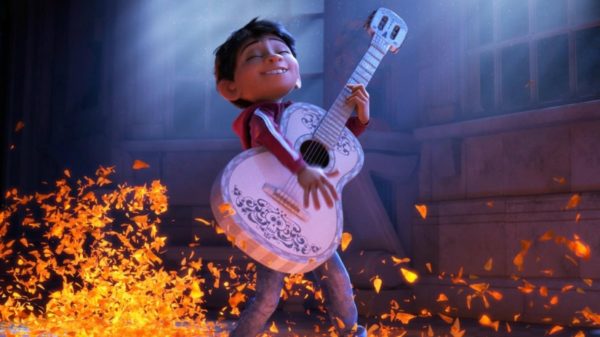Rafael Motamayor on the impact Pixar’s Coco had on him, and the overwhelming anticipation for Black Panther..
When Coco came out, it quickly became the highest grossing film of all time in Mexico, and it’s easy to see why. Asides from being beautifully made, it’s a film that respects and honours the culture it’s presenting on screen. After a rocky start with Disney trying to copyright “Day of the Dead”, Pixar was very careful to not only send a team of animators and storytellers to Mexico to learn as much as they could and get real, visual references, but the entire cast is Hispanic, and they used real Mexican bands to play songs for the film. The result is a film that works as a gift to Mexican culture, but that also has deeply impacted Hispanics everywhere because of the similarities we share and can see in the film.
I was born and raised in Venezuela and growing up I never thought about having to see myself reflected in the characters on TV or film. There were almost never any latino characters in the things I loved to watch, mainly Star Wars and Harry Potter. Whenever a film and TV show did show a latino character, it was almost always a caricature, meaning the writers just took everything they think they know about Spanish-speaking people – from Spanish bull-fighting to Argentinian tango-dancing – and reduce them all to just “Mexican.” It got to a point where I would cringe at the mere mention of a Latin-American or Hispanic character in a movie or TV show. I would rather force myself to identify with white characters than with a poor amalgam or a wide arrange of rich cultures.
Then Coco happened, and I finally saw myself and my family in a big Pixar film that I knew would be seen all over the world. Even if I’ve never celebrated Dia de los Muertos or have done an ofrenda – as soon as the grandmother takes out her sandal (or chancla/sandalia/chola) I was back in my childhood. Even if the specifics aren’t the same, the broader things that Hispanic cultures share are all there in Coco. The matriarchal family dynamic, the importance of family and how serious it is to go against their wishes. My brothers and I speak like Miguel, even if our accent is different. By the end of the film I was a sobbing mess. Even if the film wasn’t about my experience or my particular story, it was an accurate portrayal of a culture that has for years being misrepresented, and that in turn brought to light the actual similarities that we share. It was a big enough taste to make me realize just how much I needed to see an accurate Latino character in a film like this.
A friend asked why I meant representation was important in tentpole films, as supposed to movies in general or indies. The answer is very simple. Despite Call Me By Your Name being lauded by critics and by the LGBTQ community because of its beautiful portrayal of romance without falling into clichés, the film reached a peak release of 815 theaters in the US. By comparison, Pixar’s Coco and Marvel’s upcoming Black Panther will each have opened with more than 3,800 theaters in the US. There’s also no denying the impact blockbuster films have because they are the ones with merchandise that sells to children. An R-rated Oscar-nominated drama can be a triumph for the audience it’s portraying, but they won’t impact the audience in the way a superhero film can. Last year saw the release of the biggest superhero film starring a female protagonist, and Wonder Woman met with both critical and commercial success – surpassing Sam Raimi’s Spider-Man as the top-grossing superhero origin movie. This means a new generation will grow up already having a female superhero film who can stand toe-to-toe with Superman and Batman.
Black Panther was first introduced back in 2016 with Captain America: Civil War where Chadwick Boseman received critical acclaim for his portrayal of king T’Challa. The first trailer is one of the most watched movie trailers ever on Youtube, and it broke the record for pre-sale tickets on Fandango. The film’s release has been seen almost as a holiday, and the online response to every piece of marketing has been impressive in how positive it’s been. Black Panther features an almost entirely African-American cast, and the crew has spoken at length to how much care went into making the film look and feel African – from the costumes, to the aesthetics, to even the Kendrick Lamar-produced soundtrack. The film is being seen as a cultural event because of how rare it is for a film this big to have black characters front and center without them being sidekicks, or just killed off.
Hollywood studios are finally realizing moviegoers are as diverse as people, and that they are tired of seeing the same white male perspective in every single movie. The horror-film sensation Get Out, featuring a black lead and a black director, broke several box-office records and is nominated for four Oscars. A study released last year by the Creative Artist Agency (CAA) showed that films with more diverse casts outperformed others at the box office. Despite a “rotten” critical consensus on Rotten Tomatoes, the film xXx: Return of Xander Cage made three times its budget overseas, and it featured a multinational cast. With Black Panther set to become a success on all fronts, maybe studios will realize the cure to franchise fatigue is to look for different perspectives and narratives.
Rafael Motamayor













